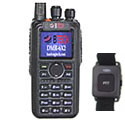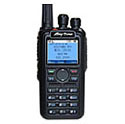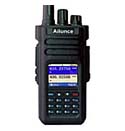Product Review
Connect Systems, Inc.
CS-800D
DMR / Analog
Dual Band Mobile
MotoTRBO Tier II compatible
John 'Miklor' K3NXU
Nate WN3I

|
The Review
This is a combined review of two new CS-800D radios received as part of an early shipment. My friend Nate (WN3I) received his last week and we spent the last few days comparing notes. CS-800D A true Dual Band DMR Tier II mobile. The code plug is in, and the radio is mounted, so let's take a look at the new addition to the DMR line up. In the Box - The CS-800D Main Body - The Remote Head - Manual - 2 Programming Cables - Mounting bracket - Misc Mounting Hardware - 16 Button Microphone - Microphone Bracket General Description - VHF: 136-174 MHz UHF: 400-470 MHz - DMR Tier II - FM capable - 25W / 50W transmit - 4000 channels - 130,000 User Dtatbase - Size: 1.8 x 6.3 x 6.9" (46 x 160 x 175mm) - Weight: 2.9 lbs (1315g) - FCC Part 90 (Aug 2019) Enclosure The CS-800D weighs in at nearly 3 lbs. Shown here is the bottom view of the radio. Although the mounting bracket was in place when I took this picture, you can still get a good look at the size of the heat sink. The radio is terminated with a UHF Type-N connector. The front panel is detachable which allows for the radio to be mounted under the seat, overhead or in back of the vehicle.
Transmitter The frequency range is 136-174 MHz and 400-470 MHz. Along with Tier II DMR, the radio also supports both Wide and Narrowband FM. As for the transmitter power, it was pretty close to where it is rated. Power level checks were verified using a calibrated VHF/UHF Bird Termaline. On pleasant observation was the current drain on transmit. I found the 50w analog mode draws the expected 10A, and DMR draws 4A.
Receiver The receiver sensitivity is excellent, and the audio quality is loud, clear and undistorted. There is no squelch tail on DMR, but the Clear Channel indicator emits a tone that lets you know when the channel is clear. The receive audio provides quality sound throughout the entire vehicle. The volume control is digital so changing the audio level may take 2 or 3 turns of the dial providing smooth level changes. Note: One of the radios tested experienced receive issues when receiving VHF. It appeared to randomly drop in sensitivity, being susceptible to frontend overload My suspicion is that it was being caused by another nearby VHF station. The source of the overload has not been identified. The radio reviewed was one the early releases. Since then, there have been hardware revisions that have addressed this issue. Removable Control Head The CS-800D is about as easy to mount as you can get. At 1.8 x 6.3 x 6.9", an under dash install is relatively easy. If space is a premium, the control head can be detached and mounted elsewhere in the vehicle. It takes a good pull to remove the front head as the tolerances are pretty tight. No rattling around here. No special high priced cable is required to connect the radio body to the remote head. We ran an extension using a standard 35' length of CAT5 cable and there was absolutely no noise or loss injected. Heat dissipation It was no surprise that when this radio is run on analog at high power for long periods of time, the heat sink is going to get hot, especially if mounted under the seat or in the trunk. . That's the nature of any high power radio. The heat sink is on the bottom and is more than sufficient to handle the 50W, but you need to meet it half way. Unless you really need every decibel of power, I would recommend running the FM mode at mid-power (35w) and mounting it with the heat sink on top. The radio body will run a bit cooler. Although the radio doesn't have a cooling fan, adding one is a simple matter and can be done with a thermal switch (KSD-01F) and a CPU fan. In the DMR mode, the radio runs much cooler and running at full power is not an issue. Audio The 800D Tx audio level is adjustable in the software and my OTA audio reports have been excellent. I set the audio gain control to 12 and talk about an inch from the microphone and the reports have all been excellent. If you like speaking away from the microphone or speak softly, you may want to kick the Internal Mic Gain Level up a notch or two. If this is mounted in the cab of a much larger vehicle, you can bring it down a peg.
The radio itself is terminated with a type N connector. If your current antenna is terminated with a PL-259, an adapter would be needed. That would add a tiny bit of loss, but if you use a quality adapter, not enough to be relevant. (.3 db) Display The monochrome display measures 5/8 x 1 3/4 (16 x 44mm) is easy to read with excellent resolution. I found the display is large, easy to read and not cluttered.
Each button on the front panel is capable of dual functions selectable by either a quick key press or long press. I found plenty of flexibility with the nearly 40 options available. Programming and Software The Programming Software was downloadable from the Connect Systems website. Select View Amateur Radio, then Software and CS-800D. A unique feature of the software is the Field definition. If you see a field that you don't recognize, there is a field definition that appears at the bottom of the page describing what the function is and how it works. This makes it extremely easy for the first time user. There were two positive things I noticed from the start. If the Rx contact is set to None, the software will default to the same contact as the Tx. Also, when adding new channels, I was able to cut/paste by creating a block of empty channels and simply cut/paste the data from one channel to another, only needing to change the frequency of the new channels. Not all software is this friendly, but this will save you a good bit of data entry. Each Scan List can include up to 32 channels and be any mix of VHF, UHF, DMR and Analog. I posted a sample code lug for the 800D at Miklor Code Plugs. The code plug is based on repeaters here in southern PA, but changing the I/O frequencies should get you started in the right direction. Firmware The CS-800D firmware is fully upgradable. If upgrades are made available, they can be upgraded with a standard Windows based PC. The latest firmware is always on the Connect Systems website. The latest firmware update allows for 130,000 DMR user IDs as compared to the original 65,288. As of Sept 2020, there are nearly 190,000 DMR IDs, so the database will need to be trimmed a bit before loading. Programming Cable There are two programming cables for the CS-800D. One uses a USB to DB-15 connector for firmware upgrades and general programming of the radio. The other is a USB to RJ-45 which is used for programming the microprocessor in the control head should additional features be added in the future.
We had the opportunity to use this radio for the past few weeks and have had all positive results. Being able to switch from the local VHF to the UHF DMR repeater with a single press of the microphone button can spoil you very quickly, and having the analog mode right there is another plus. In the Connect Systems tradition, this radio was not rushed to market. It's a solidly built DMR radio designed around a Tier II platform. This is a true high quality Dual Band DMR/analog radio that will not disappoint and their customer support is second to none. Concerns - Cannot field program - Does not display Zone info FCC Part 90 As of August 2019, the CS800D received its FCC Part 90 certification. Note: This equipment was loaned to me by a friend. This is an unbiased review. All findings are factual based my personal experience.
|
BTECH  DMR6X2 PRO Dual Band (Review) Anytone  D878UV II+ Dual Band (Review)  D578UV Series Mobiles Hotspot  SkyBridge MAX (Review) Ailunce  HD1 / GPS (Review) Amplifiers  BTECH DMR Amps UHF VHF (Review) Repeaters  Ham / GMRS Commercial Repeaters Duplexers |
BTECH  DMR6X2 PRO Dual Band (Review) Anytone  D878UV II+ Dual Band (Review)  D578UV Series Mobiles Hotspot  SkyBridge MAX (Review) Ailunce  HD1 / GPS (Review) Amplifiers  BTECH DMR Amps UHF VHF (Review) Repeaters  Ham / GMRS Commercial Repeaters Duplexers |







